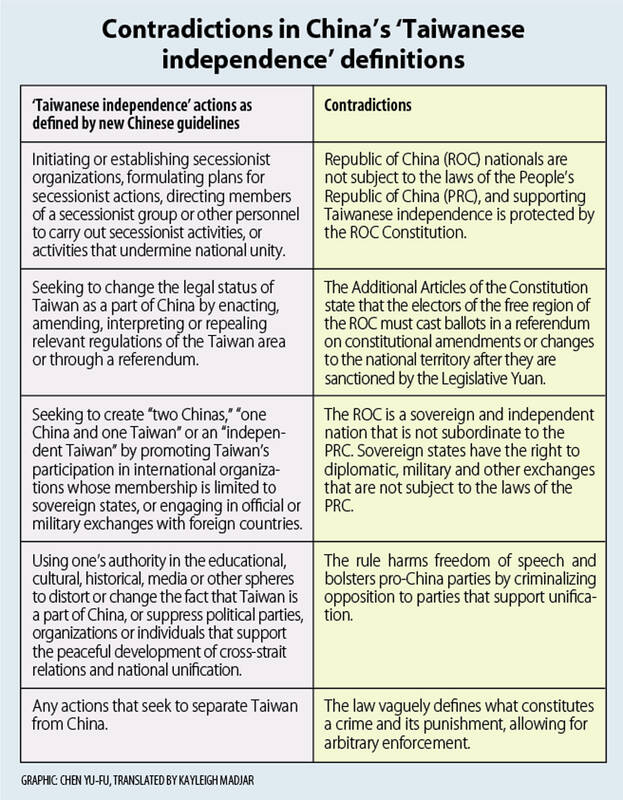Taiwan should appeal to the international community to show that China’s guidelines threatening the use of the death penalty against Taiwanese independence supporters violates the spirit of the UN charter and human rights, academics said yesterday.
China on Friday issued new guidelines to “severely punish Taiwanese independence diehards for splitting the country and inciting secession,” including the use of the death penalty in “particularly serious” cases. Crimes worthy of punishment include promoting “two Chinas,” “one China, one Taiwan” or “Taiwanese independence.”
At a forum in Taipei held by the Association of Chinese Elite Leadership, association research fellow Wang Chih-sheng (王智盛) said the guidelines are comparable to Hong Kong’s National Security Law, as they allow China to conduct trials in absentia for any behavior it deems to “split the state.”

That means Taiwanese who travel or transfer in China, Hong Kong or Macau, or take a Chinese airline, would put themselves at risk of being arrested by Chinese authorities, Wang said.
Even campaigning for Taiwan to join international organizations is considered an offense under the guidelines, such as when Deputy Legislative Speaker Johnny Chiang (江啟臣) last month traveled to Geneva, Switzerland, to advocate for Taiwan’s participation in the 77th World Health Assembly, he said.
The guidelines are part of a long-prepared strategy for Beijing to weaponize its judiciary to criminalize Taiwanese independence and deter advocates with elaborately devised rules, Prospect Foundation vice president Raymond Sung (宋承恩) said, adding that the guidelines follow Beijing’s remark on May 21 that President William Lai’s (賴清德) inaugural speech was his “confession of Taiwanese independence.”
Whether Taiwanese traveling overseas would be arrested and extradited to China for trial depends on whether China can exercise the illicit jurisdiction it asserts in other countries, Sung said.
Many nations suspended extradition agreements with China when it began to prosecute and imprison Hong Kongers for political reasons under Hong Kong’s National Security Law, he said.
The government should argue to the international community that China’s guidelines contravene international law, including its illicit expansion of extraterritorial jurisdiction and human rights violations by incriminating individuals for their speech or political opinions, he said.
Taiwanese should be careful of the 65 countries that have treaties on mutual legal assistance in criminal matters with China, Taiwan Thinktank researcher Wu Se-chih (吳瑟致) said.
This does not automatically mean those countries would necessarily extradite Taiwanese to China, but the risk is higher in some African, Middle Eastern and Southeast Asian countries, Wu said, adding that Tibet independence activists had been repatriated to China by the Thai and Malaysian governments.
The Straits Exchange Foundation has received 84 reports of personal security incidents from January to May, he said, adding that Taiwanese should avoid traveling to China, Hong Kong or Macau as the territories would enforce the guidelines.
Allowing trials in absentia is clearly at odds with the spirit of the UN Charter, and Chinese President Xi Jinping (習近平), who approved the guidelines, is the one seeking to tear apart the cross-strait relationship, Taiwan Association of University Professors chairman Chen Li-fu (陳俐甫) said.
The government should ban travel agency tours to China and tell people not to transfer flights in China, Hong Kong or Macau, as they could be arrested there, he said.

A magnitude 4.9 earthquake struck off Tainan at 11:47am today, the Central Weather Administration (CWA) said. The hypocenter was 32.3km northeast of Tainan City Hall at a depth of 7.3km, CWA data showed. The intensity of the quake, which gauges the actual effect of a seismic event, measured 4 in Tainan and Chiayi County on Taiwan's seven-tier intensity scale, the data showed. The quake had an intensity of 3 in Chiayi City and County, and Yunlin County, while it was measured as 2 in Kaohsiung, Nantou County, Changhua County, Taitung County and offshore Penghu County, the data showed. There were no immediate reports of

‘DENIAL DEFENSE’: The US would increase its military presence with uncrewed ships, and submarines, while boosting defense in the Indo-Pacific, a Pete Hegseth memo said The US is reorienting its military strategy to focus primarily on deterring a potential Chinese invasion of Taiwan, a memo signed by US Secretary of Defense Pete Hegseth showed. The memo also called on Taiwan to increase its defense spending. The document, known as the “Interim National Defense Strategic Guidance,” was distributed this month and detailed the national defense plans of US President Donald Trump’s administration, an article in the Washington Post said on Saturday. It outlines how the US can prepare for a potential war with China and defend itself from threats in the “near abroad,” including Greenland and the Panama

The Chinese Nationalist Party (KMT) is maintaining close ties with Beijing, the Democratic Progressive Party (DPP) said yesterday, hours after a new round of Chinese military drills in the Taiwan Strait began. Political parties in a democracy have a responsibility to be loyal to the nation and defend its sovereignty, DPP spokesman Justin Wu (吳崢) told a news conference in Taipei. His comments came hours after Beijing announced via Chinese state media that the Chinese People’s Liberation Army’s Eastern Theater Command was holding large-scale drills simulating a multi-pronged attack on Taiwan. Contrary to the KMT’s claims that it is staunchly anti-communist, KMT Deputy

RESPONSE: The government would investigate incidents of Taiwanese entertainers in China promoting CCP propaganda online in contravention of the law, the source said Taiwanese entertainers living in China who are found to have contravened cross-strait regulations or collaborated with the Chinese Communist Party (CCP) could be subject to fines, a source said on Sunday. Several Taiwanese entertainers have posted on the social media platform Sina Weibo saying that Taiwan “must be returned” to China, and sharing news articles from Chinese state media. In response, the Mainland Affairs Council (MAC) has asked the Ministry of Culture to investigate whether the entertainers had contravened any laws, and asked for them to be questioned upon their return to Taiwan, an official familiar with the matter said. To curb repeated